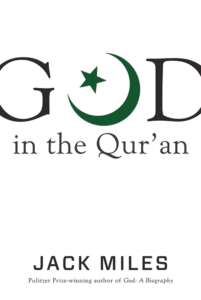Reviewed by NEAL GENDLER
So why should Jews want to read a book called God in the Qur’an?

First among several good reasons that include America’s growing Muslim population: because the book is interesting and insightful in comparing the Muslim version of God’s message, actions and demands with those of the Bible.
“Jews and Christians are often surprised to discover that iconic figures from their scriptures do, indeed, appear, even repeatedly, in the Qur’an,” says Jack Miles. “This striking fact will be, for us … a doorway into the Qur’an,” showing how it expands, contracts or revises the Bible’s account.
For Muslims, Miles says, the Qur’an “is God’s last word to mankind, the crown of revelation, restoring what Jews and Christians had lost from or suppressed in their scriptures by oblivion or corruption.”
Miles, distinguished professor emeritus of English and Religious Studies at the University of California, Irvine, is an Episcopalian who previously wrote the Pulitzer Prize-winning God: A Biography, then Christ: A Crisis in the Life of God. God in the Qur’an, he says, is written “as a literary critic writing quite consciously for an audience crowded with unbelievers.”
He says his “goal is not a general introduction to the Qur’an” and “I take no position on … whether the Qur’an is of divine or human authorship.”
He draws biblical quotations from the Catholic New Jerusalem Bible. Observant readers will note some wording differences from the Jewish Publication Society translation.
For this review, I am accepting Miles’ spellings and citations of the Qur’an. His primary Islamic source is The Qur’an, by Tarif Khalidi.
A bit jarring to Jews, he translates and uses the four letters we say as adonoiinto the Y word — “respectfully,” he says — claiming that “there is no doubt that Ancient Israel did refer to God by his proper name, however it may have been pronounced.” The Jewish Virtual Library agrees, saying substitution became customary by the time of the Talmud. I thought substitution was mandatory.
Miles explains a difference in God’s delivery:
“In the Qur’an, Allah is omnipresent because He is the speaker [through Muhammad] at every moment. When a story is being recalled, He is, accordingly, the narrator. In Genesis, by contrast, when a story is being told, the narrator is anonymous.”
Miles says the Qur’an doesn’t repeat the creation story or many other parts of the Bible; these are assumed to be known.
“A key part of Allah’s message to Muhammad consists precisely of corrected versions of biblical stories, such as the story of Joseph, stories that Muhammad already knows in a general way but has not previously heard from Allah himself and could not have known in this form without Allah’s revelation.”
Joseph in the Qur’an is found innocent, Potiphar’s wife guilty, and Joseph asks Allah to accept him as a Muslim.
Noah appears twice, each time warning of destruction. The first appearance mentions no ark; Miles says apparently all but Noah die. The second time, there’s an ark with the animals, others who believed Noah, and his family except for an unbelieving son who dies in the flood.
The Qur’an claims other Bible characters for itself.
“Although Adam became the first Muslim by repenting immediately of his disobedience and submitting himself to the judgment (and punishment) of Allah, it is Abraham whom the Qur’an presents as the truly paradigmatic Muslim,” championing Allah against “pretenses of any alleged rival,” Miles says.
“Because Allah repeatedly expresses His warm approval of Abraham, almost His delight, Abraham is uniquely important as a vehicle for Allah’s indirect self-characterization in the Qur’an,” Miles says.
The Akedah appears, but the son is unnamed and there’s no wood, binding or knife, Miles says. The point is submission to Allah.
The Qur’an rejects Jesus’ divinity, making him the last prophet before Muhammad, Miles says.
Jews “not only rejected him [Jesus] but sought to kill him, as, according to Allah, they had killed earlier prophets,” Miles says. Jewish dietary laws “are part of Allah’s punishment for this latest sin.”
One might note, however, that observant Muslims also don’t eat pork.
***
Neal Gendler is a Minneapolis writer and editor.




















